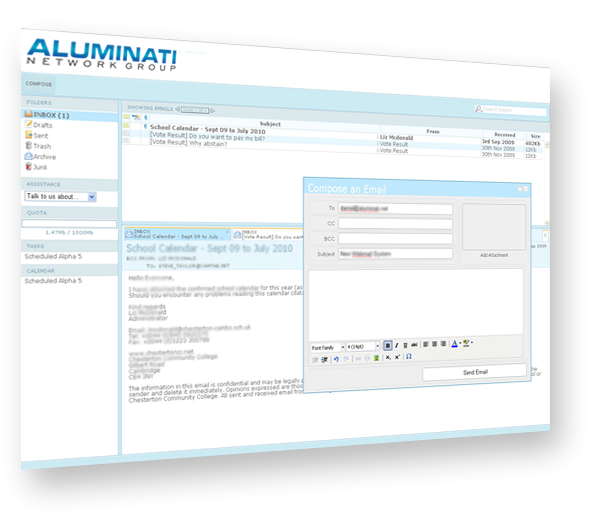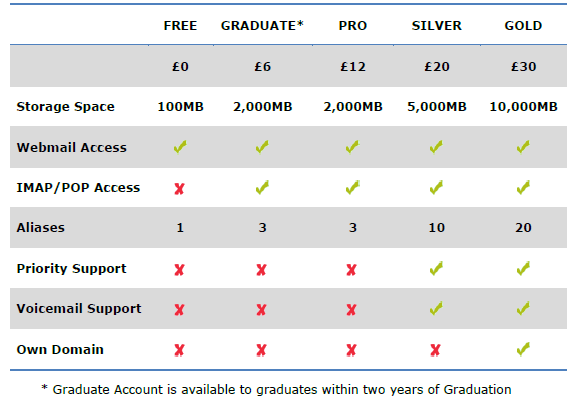DIRECTOR'S REPORT (JUN '10): Aluminati Upgrades and Changes
Dear Members,
It has been some time since I last wrote to you back in March to explain the proposed technical improvements to our underlying infrastructure. I look forward in this article to updating you as to progress on this, as well as a few other items of interest:
Infrastructure Update Enhanced Webmail (with Demo Preview!) New Account PackagesInfrastructure Update
Since those major failures in February, we have carried out considerable work to stabilize our systems, achieving complete independence from the (Storage Area Network) SAN system that caused us so much trouble.
Admittedly we have had a handful of outages since then and have traced these back to some memory failures in two of our machines (one storage server, one web server). As soon as they were identified, those memory chips were replaced with new ones which have since been stable.
You may also remember two power failures in March – one caused by a lightning strike incident which took down a large portion of our entire data-centre (DC) (20,000 or so servers) on the 12th March. We restored service in just over 1.5 hours and thereafter we put a great deal of pressure on the DC providers to ensure appropriate protection was put in place. We can now confirm that the necessary steps have been taken and audited by an external, government supplied electrical professional.
For our part, we have taken the improved technical architecture, outlined in the last article, to an even higher level. Investing heavily, we have made every possible layer and component in our system fault-tolerant and have deliberately over-engineered our solution. On paper, it looks like a highly reliable system and we are confident it will perform well once properly bedded in.
To give you a picture of the level of fault-tolerance, here are the details:

- We are running completely independent power feeds to our server cabinet, known as “A-B Power”.
- Each power feed is fed by a separate string of Uninterruptable Power Supplies (UPS) – effectively a huge rack of batteries that can run all the servers in the event of power failure.
- Each UPS has three strings of batteries – even if two of them fail, the UPS will still operate.
- Each feed has its own diesel generator which will kick in automatically before the UPS batteries run dry.
- Power lines enter at opposite ends of the building and are connected externally to separate substations. In the event an entire substation fails, we will still draw power from the other line. With this, we will be able to survive another lighting strike without impact on service.
Multi-Sourced External Power Supply

- We run dual Power Transfer Switches (PTS) in our cabinet. This is essentially a power supply, powered by both the A and B feeds, that can detect and provide instant fail-over to the other power feed should one line fail.
- Each of our critical servers (the ones holding your data) receives a power feed from BOTH of these switches. If either PTS fails, they will instantly draw power from the other PTS. In fact, even if an internal Power Supply Unit (PSU) within the individual server fails, it will draw power from the other PSU.
- Each non-critical server cluster will be load-balanced across the PTS’s so that even if one fails there will be sufficient numbers on the other PTS to continue service.
Multi-Sourced Internal Power Supply

- Within our private secure cabinet we run two CISCO 3750 network switches. These are high-quality network hardware units that have a feature called ‘Stackable’. This means they can be linked together and, in the event that one unit fails, the other unit instantly takes over service, ensuring that the network can continue to function smoothly.
- Naturally each switch is power-fed from a different PTS (each of which is fed from divergent power supplies)
- Each server has dual network ports and is plugged into BOTH of the network switches. If either switch fails, the other port can communicate through the working switch. If a network card in the machine fails, the Operating System will switch to the other network card instantly, using bonded connections.
- With diverse external connectivity our cabinet has two routes to the internet. Each route is fault-tolerant itself, but in the event that one path should go down, we can switch all incoming traffic to our alternative route within a short space of time.
Multi-Sourced Network Feeds

- We are upgrading 90% of our servers to new faster hardware with server-grade components.
- All critical data servers will have data mirrored across multiple internal disks using RAID 10, allowing up to two disks to completely fail simultaneously without loss of service.
- Each RAID card is installed with a battery back-up unit to prevent data loss in the, now unlikely, event of a power outage.
- Critical servers have ‘hot swap’ chassis allowing faulty disks to be replaced without taking the server offline.
- Each data store is replicated (see last article) to another fault-tolerant server.
- Critical servers have dual power supplies and dual network cards
High-end Fault-Tolerant Hardware
New Architecture Roll-Out
The first phase hardware is now being installed. This consists of getting the network gear set up and tested and perimeter servers (firewalls) set up. Our first core services to be installed will be a new backup server and an additional data-store. Once the data-store is set up we will start migrating users. Phase 1 should be complete by the end of June and a full system update completed by September. The only impact you should notice is if you try to log in during your individual account being migrated. This should not take more than a few minutes so please do wait a short while then try again.
Enhanced Webmail
Whilst the above system updates will ensure we have a solid reliable foundation, it does little to change the way you interact and use the service. We are aware that our current webmail system is starting to age again so we have invested considerable development time in building the next generation interface.

As you will have noticed in our annual account renewal survey, we always ask for feedback about the service and especially about the webmail interface that so many of you use on a daily basis. We have been diligently collating this feedback to ensure that our next release fulfils the most important and frequently requested features.
Far and away the most requested improvement is for a FASTER webmail experience so we have concentrated our efforts to this end.

Faster Webmail
We have employed AJAX technologies to ensure that our system responds to you as quickly as possible. The ‘A’ in AJAX stands for ‘Asynchronous’. The old system made you work at the speed of the server. If the server was busy, it would make you wait. With asynchronous technology, we can take your command and respond back to you immediately. Meanwhile, whilst you are working on your next email, we can complete your command in the background. Only if there is a problem would we ask for your attention, otherwise you can assume that your command has been executed.

Intelligent Pre-Fetching
We have used advanced caching methods to ensure that you do not keep having to download the same emails repeatedly. Once you have seen an email once, you can switch back to it instantly. We are also using system intelligence to predict which emails you are likely to want to open next. The simplest example being that if you log in and see 5 unread emails, we will go and fetch those emails in the background for you. Almost before you’ve clicked to read the first email, they will all have been pre-loaded for you.

Tabs
Sometimes you need to have a few different emails open at the same time for easy reference. Our new webmail system allows you to double-click an email to open it in a new tab. You can flick through different tabs, instantly referencing the various emails you require.

Multiple Compose
Sometimes you will be half way through writing one long email then realize there is another small one you need to quickly send. The old system did not allow you to compose more than one email at a time but the new webmail lets you have multiple emails on the go simultaneously.
Webmail Demonstration Account
It is with quite some excitement that we give you access to an advanced view ‘Alpha release’ demo of this system which, whilst function limited, will hopefully give you an impression of the speed improvements we have achieved.
This demonstration is limited to one demo account. It is hosted on exactly the same servers as your current account but contains speed-enhancing improvements. Sending email will work but, to avoid abuse, emails will not actually be transmitted to the final destination.
We will be running a series of Alpha and Beta tests, private and then public. There is a link within the demonstration to allow you to register your interest to participate in these tests. This will enable you to use your own email account with the new system in return for reporting any bugs you find.
This demonstration also allows you to easily send us your initial impressions, feedback and reports of bugs. Simply click the drop-down on the left under ‘Assistance’.

New Account Packages
After several years of maintaining enhanced account packages more-or-less the same, we have decided to spend some time analyzing how our membership is using our choice of packages. Paid packages range from the ‘Graduate’ account at £4.99 to the ‘Mail Vault’ at £44.99. The structure of our packages has always been to be sympathetic to the price-conscious newly graduated whilst offering, through our ‘Professional’ and ‘Gold’ level accounts, more premium services to those established professionals a year or two into their careers.
The Professional account is the level where we would have hoped most people to end up after two years with the service. In practice, because we have been increasing the storage of our Graduate account most years, the need to upgrade to ‘Professional’ is often reduced. This has lead to a rather bottom heavy spread of account subscriptions and, as we are sure you will appreciate, this is not conducive to our maintaining a healthy investment which is what is required for us to provide a premium, ad-free service with a high level of personal support.
In fact, we have been contacted multiple times by members expressing a clear willingness to pay a slightly higher price in return for upgrades to various aspects of the service. This has led us to creating a more balanced range of accounts which keep prices realistic and in some cases actually offer you more for less.
Our New Packages Explained

Free Webmail
As you know, our basic package is “free for life” and of course this will continue to be available. With our new packages we have actually upgraded our free package to a more usable 100MB (previously 10MB). This account will still be ‘Webmail only’ and will of course maintain all forwarding services.

Time Limited Graduate Account
We are keeping a low-cost Graduate level account as a “special” available to graduates within two years of leaving. This entitles them to a full 50% discount off our Professional account. 2010 graduates registering now will be entitled to this discount until their second renewal in 2012.

Pro Account
Our new standard account will be the Professional account offering a respectable 2000MB of storage; in the vast majority of cases enough to last several years. This will be priced at £12 / year (which is still just £1 / month). This is a reduction on our current Professional account (£14.99).

Silver Account
With 5000MB of storage this account also benefits from Priority support. For this we are currently investigating the ability to log your tickets using a voicemail to avoid having to type lengthy emails. We still cannot justify operating a call centre but this would be an easier way for you to get in touch with us to explain your problem.

Gold Account
With 10000MB of storage and Priority support, the main feature of the Gold account is the ability to host your own domain (domain price not included) with us. This means you can map your own email domain to your alumni email account.
Package Overview

Payment Charges Eliminated and Direct Debits Coming Soon!
We will also be dropping our 40p payment surcharge for online card payments. Whilst this fairly represents the additional expense we incur, feedback has suggested that we would offer a more positive experience. We are also going to be seriously looking at introducing a Direct Debit scheme which many of you have asked for. This will eliminate the effort required to renew each year.
New Package Introduction Dates
These packages will be introduced from the 1st of August 2010. All renewals until then will be able to renew at the current package pricing. Anyone subscribing to a package from 1st May 2010 will be entitled to a free upgrade on request to their nearest equivalent package:
| Current Package | Free Upgrade To |
|---|---|
| Professional 2GB | Pro 2GB + 3 months free |
| Gold 3GB | Silver 5GB |
| Platinum 4GB | Silver 5GB + 3 Months Free |
| Diamond 5GB | Gold 10GB |
| Mail Vault 10GB | Gold 10GB + 6 Months Free |
We hope that you will support us with this new pricing structure to enable us not only to continue providing the service you rely on from day to day, but also to invest in making improvements that will increase your efficiency and enjoyment of using our service.
As ever, if you have any comments please do not hesitate to get in touch.
Yours faithfully,

Daniel Watts
Managing Director